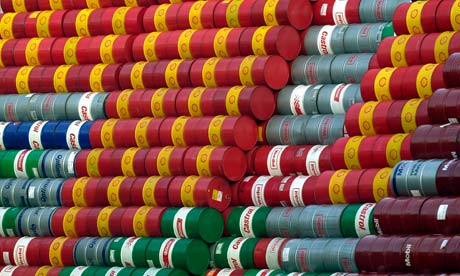How Much Oil Does Saudi Arabia Actually Have?
posted on
Feb 16, 2011 12:04AM


Is it 260bn or 550bn barrels? Should we believe the Americans or the Saudis? The answer may lie in the provenance of the information

Oil barrels. Are the Saudi reserves really 260bn barrels, 712bn or 550bn? Photograph: Kay Nietfeld/Corbis
-
Does anyone know how much oil Saudi Arabia has left? Last week a series of US diplomatic cables from 2007-2009 and released by WikiLeaks suggested that senior US embassy staff were warning Washington that reserves could be 40% less than stated and that "peak oil" might be imminent.
The source of this new information was Sadad al-Husseini, a senior geologist and former head of exploration at the Saudi oil monopoly Aramco who, the cables revealed, disputed the official figure of 716bn barrels of total reserves. In further cables, the US embassy suggested that Saudi Arabia would not be able to prevent oil prices from going through the roof because it could not produce enough.
The Guardian published the four cables online, which ignited debate in the oil industry, the markets, the press and the peak oilists.
Al-Husseini, a Saudi insider, had form in the sense that he has publicly questioned Saudi Arabia's stated reserves before, but this was the first time that the US government had been seen to be taking him – or peak oil – seriously.
But over the weekend, al-Husseini turned on the American diplomats and the press, saying that he had been misrepresented. In a series of letters and interviews, he said:
"The US consulate note issued by WikiLeaks in regards to Saudi Aramco's oil reserves, based on a casual 2007 conversation with me, includes many patently inaccurate statements that have been further amplified by errors in the press.
"I do not and did not question in any manner the reported reserves of Saudi Aramco which are in fact based on the highest levels of sound and well established engineering and economic principles and practices. Since Saudi Aramco's proven oil reserves are 260bn barrels, there is no way I could have said they are in error by 300bn barrels, a number that exceeds the actual reserves estimate itself.
"In fact the US consulate staff who approached me socially stated that Saudi Aramco's published proven reserves should be more than tripled to include non-producible oil and oil that has not even been discovered. I defended Saudi Aramco's professional practices and official reports and confirmed that Saudi Aramco adheres to the highest levels of accepted industry procedures and practices.
"In regards to Saudi Aramco's oil production capacity, the giant multi-billion dollar expansion projects which were funded in recent years are now all a visible reality for the whole industry to see across the Saudi oil fields. This has been an extraordinary accomplishment by Saudi Aramco and its leadership spanning engineering, construction and operations from Khurais in central Arabia to Shaybah in the Rub al Khali. All these oil production projects were completed by the end of 2009 and the kingdom's total oil production capacity does in fact now stand firmly at 12.5m barrels per day".
So, is Al-Husseini accusing the Americans of lying? Who are we to believe? Are the reserves really 260bn barrels, 712bn or 550bn? Someone must know.
The answer may lie in the provenance of the information. Al-Husseini, remarkably, says his contact with the US embassy in Riyadh was at a "casual", "social" meeting, rather than anything formal or on the record. Not only that, he says, the US diplomats told him that Saudi Aramco's published proven reserves should be "more than tripled" to include non-producible oil and oil that has not even been discovered.
In short, he seems to be saying that the Americans wilfully or accidentally misunderstood what he was saying and then tried to tell him he had got it wrong. It suggests a few men standing around at a cocktail party, ears wagging, slightly tired at the end of a day. It is intriguing in a John le Carré way. Did the Americans bring the subject up deliberately, was it al-Husseini planting information? Or just tittle-tattle small talk?
Whatever. The problem is that al-Husseini has flagged up imminent peak oil before - which could be why the markets did not react that much last week - and while he says in the cables that he is no "peakist", he certainly talks like one.
My own hunch is that the Saudis have in the past tolerated al-Husseini questioning their reserve estimates and the date of peak oil. But with oil now rising above $100 a barrel and the Middle East in political turmoil, these cables could only destabilise the situation further.
So, pressure was put on him by someone to calm people down with a statement. As ever, the US government has declined to say anything in public in response to WikiLeaks.
But equally, it rings true that an American diplomat at a social gathering should misunderstand someone and report back an error to base.
The wonder is that there is no record in the cables of anyone in Washington asking the Riyadh staff for any clarification, or for any checks to be done on al-Husseini's staggering figure of 40%. You would think that someone in the state department would recognise the seriousness of this statement by so credible a figure and would want to know more.
If al-Husseini had said "actually we will have no oil left all after next Wednesday" would anything have happened? Does anyone in the administration actually read the cables?
http://www.guardian.co.uk/environment/blog/2011/feb/15/oil-saudi-arabia-reserves